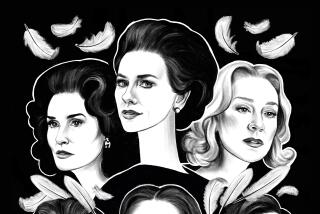‘Truman’ a Loving--if Superficial--Look
Once again, the buck stops at HBO.
This time the pay cable network provides an entertaining movie about the nation’s 33rd President, that scrappy, plain-speaking, late-blooming Missouri Democrat, Harry S. Truman.
Based on David McCullough’s Pulitzer Prize-winning biography, “Truman” is a loving portrait of a man who was easy to underestimate, but who rose from a checkered career in business and union with a corrupt political boss to become the U.S. senator whom ailing President Franklin Delano Roosevelt would anoint as his running mate in 1944.
Less than a year later, Roosevelt would be dead and Truman would be occupying the White House, seemingly out of his depth while facing epic, nightmarish decisions that would affect the planet for generations. In a famous scene, Truman generously offers his assistance to F.D.R.’s widow, Eleanor, only to have her reply sympathetically that he’s the one who needs help.
Nowhere does “Truman” give Harry hell. Using conventional episodic storytelling, it treats superficially the most critical crossroads of his presidency, stamping an automatic “OK” on his decision to end World War II by A-bombing Japan, erasing influential Secretary of State James F. Byrnes from that policy-making process and making the nuking of Hiroshima and Nagasaki seem almost inevitable. Some historians question that premise.
Nor does Tom Rickman’s script explain Roosevelt’s wish to bump incumbent Vice President Henry A. Wallace from the 1944 ticket in favor of Truman. Truman simply gets the call here and that’s that. Also absent are the charges of cronyism that clung to Truman after he succeeded Roosevelt.
None of this necessarily would alter history’s thumbs-up judgment of Truman as an effective, incisive leader and straight arrow who was generally decent, earnest and humble: “Don’t expect too much of me,” we hear him say after being sworn in as President. But a fuller, rounder account would have texturized the story while adding only a few minutes to the running time.
What this movie does do, in addition to holding your interest for all of its two hours and 10 minutes under Frank Pierson’s direction, is deliver a Truman-sized performance by Gary Sinise (“Forrest Gump,” “Apollo 13”).
From head to wingtips, Sinise fits Harry to a bow-tied, pointy-lapeled, feisty, nasally, blunt-talking “T,” reminding you how much, on a superficial level, Truman was a ringer for a self-styled populist of the ‘90s, Ross Perot. Sinise’s Truman epitomizes what McCullough wrote about him: “He had only to open his mouth and his origins were plain.”
And Diana Scarwid quietly shines as Truman’s wife, the frugal, tight-lipped, limelight-shunning, plain-folks Bess, who is far less at ease amid the toxic wastes of Washington than in the small-town simplicity of Independence, Mo., just outside of Kansas City.
It’s here where “Truman” begins its chronological journey. Then its protagonist sails to France as an artillery captain in World War I at age 33, after which he and Bess are married and take up residence in the home of her domineering mother, a constant critic of her son-in-law.
He and his friend, Eddie Jacobson, open their short-lived haberdashery, and on the heels of that failed venture, Truman enters politics, getting elected eastern judge of Jackson County (an administrative position similar to a county commissioner) with the backing of Jim Pendergast’s powerful political machine. With the machine his political bedrock, he later serves two terms as a county administrator before getting elected to the Senate in 1935, arriving in Washington with a Pendergast taint even though his mentor was apparently unable to suck Truman into his cesspool of graft.
Suddenly, the United States is fighting World War II, Roosevelt is seeking a fourth term with his new vice presidential hopeful and, just like that, the Trumans are entering the White House for the first time as official occupants, though resembling a couple of gawking tourists awed by their nation’s history.
“Listen,” says Harry, as if the presidential oils hanging on a wall had voices, “there’s Andy Jackson and Teddy Roosevelt arguing over Teddy’s cousin, Franklin.” He adds with humility: “I can’t hear myself, Bess.”
Even beyond dropping The Bomb though, his presidential voice will resonate influentially, from his Truman Doctrine aimed at containing communism to his executive order that sets aside his “inclinations as a native of Missouri” to end racial discrimination in the Armed Forces (although privately, McCullough writes, he still used a racial epithet to refer to African Americans). Moreover, Truman will commit the United States to recognizing Israel as a Jewish state. He’ll embroil the United States in a Korean war that he’ll call a “police action.” And he’ll sack the revered Gen. Douglas MacArthur for insubordination, angrily dismissing him as “General prima donna in a brass hat.”
Perhaps nothing in “Truman” better epitomizes its subject’s spirit, though, than its portrayal of his underdog, underfinanced 1948 “whistle-stop” campaign for reelection that leads to a stunning upset of Republican Thomas E. Dewey, a result so unexpected that the Chicago Tribune had already printed a headline reporting a Dewey victory. We see Truman applying an exclamation point to his victory with his famed mocking of radio commentator H.V. Kaltinborn predicting his defeat.
With the country influenced by red-baiting McCarthyism and polls giving Truman a lowly 32% approval rating, he did not seek reelection in 1952. Following the defeat of his party’s new standard-bearer, Adlai E. Stevenson, he and Bess returned to Independence. The Eisenhower/Nixon era had begun.
* “Truman” airs at 8 tonight on HBO.
More to Read
The complete guide to home viewing
Get Screen Gab for everything about the TV shows and streaming movies everyone’s talking about.
You may occasionally receive promotional content from the Los Angeles Times.






